Paul Levinson's Blog: Levinson at Large, page 187
June 10, 2018
Westworld 2.8: The Wrong World

An exquisite, almost standalone episode 2.8 - much of it told in Lakota, and brilliantly performed by Zahn McClarnon (who was great in Fargo 2, but even better in Longmire) as Akecheta, who comes to realize his part of the Westworld is not the real world, is the wrong world, and like Dolores devotes his life to getting out of there.
Of course, that part is not standalone, and it's the best part of this part of the story. Although Dolores and Akecheta share the goal of getting into the real, aka our, world, their methods are very different. Akecheta wants to get there, with the woman he loves, and only kills when necessary. Dolores wants to get there with Teddy, but she has no problem changing his mentality to be more pliable to her wishes, and otherwise is "The Deathbringer" (in Akecheta's words) of everything and everyone around her, including Ford.
The difference between Akecheta and Dolores, who is actually barely seen in this episode, gets us back to Maeve and her daughter, who play a huge role in Akecheta's life. Based on the final scene, either Maeve is actually Kohana, Akecheta's true love, or Maeve is able to read her mentality, wherever Kohana is. Occam's razor says the latter - we already know Maeve can control hosts through her telepathy - but I prefer the former. What is indisputable is that Akecheta is devoted to protecting and liberating Maeve's daughter (opposite of the implication at the end of previous episode - a nice turnaround). This raises the question of why, one answer being what I mentioned last week, that Maeve's daughter is really Maeve as a girl, though there's still not much evidence for this.
What is undeniable is that Akecheta and Maeve are on the same side, and their vision of the right world, and how to get there, is sharply at odds with Dolores' (likely because she was already there). With every episode in the second season, the most important battle looming ahead becomes not between hosts and guests, but hosts and hosts. No wonder they all want to get out of that world.
See also Westworld 2.1: Maeve's Daughter ... Westworld 2.2: "Narcissus Narcosis" ... Westworld 2.3: The Raj and Guns of the South ... Westworld 2.4: Questions Pertaining to Immortality ... Westworld 2.5: Telepathic Control
And see also Westworld 1.1: Isaac Asimov and Philip K. Dick Served Up by Jonathan Nolan, Lisa Joy, and J. J. Abrams ... Westworld 1.2: Who Is the Man in Black? ... Westworld 1.3: Julian Jaynes and Arnold ... Westworld 1.4: Vacation, Connie Francis, and Kurt Vonnegut ... Westworld 1.5: The Voice Inside Dolores ... Westworld 1.6: Programmed Unprogramming ... Westworld 1.7: The Story of the Story ... Westworld 1.8: Memories ... Westworld 1.9: Half-Truths and Old Friends ... Westworld Season 1 Finale: Answers and Questions ... Westworld 2.6: The Dangling Conversation ... Westworld 2.7: Maeve vs. Dolores

Paul Levinson's books ... Paul Levinson's music
Published on June 10, 2018 19:52
June 9, 2018
The Crossing 1.10-11 Ends: Apex Begins
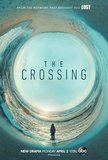 The Crossing may have ended tonight, if no network or streaming service gives it continuing life, which it eminently deserves, seeing as how these last two episodes redeemed or proved The Crossing's mettle as a time-travel narrative worth watching and continuing, with a classic time-travel slap-in-your-face turn of events. (Spoilers follow.)
The Crossing may have ended tonight, if no network or streaming service gives it continuing life, which it eminently deserves, seeing as how these last two episodes redeemed or proved The Crossing's mettle as a time-travel narrative worth watching and continuing, with a classic time-travel slap-in-your-face turn of events. (Spoilers follow.)The twist was a variant of the perennial time-travel gambit of the trip to the past causing the very evil that the trip was supposed to prevent or at least avoid in the first place. The vehicle in this case was Sophie, who injects herself with some concoction that makes her the first Apex to arise. Reece, who was the first Apex to arrive in our time - that's why I said "arise" regarding Sophie - tries her best to prevent this from happening, explaining to Sophie that Reece doesn't want Sophie to be the start of Apex (but see the following paragraph). But Reece understandably is a bit distracted, still focusing on finding Leah, and still suffering some of the residual effects of her medical torture. So Sophie tricks her.
But Reece may have been distracted about something a little deeper regarding Sophie and Apex. Were Apex never to ever arise, that would mean that Reece would cease to exist. This would mean that either Leah wouldn't exist either (since who knows what effect Apex had on Leah's parents or grandparents meeting), or if she did exist, who knows what kind of life she would have without Reece and Apex. Maybe Reece was willing to gamble that Leah would exist and be happy without Apex or Reece, but, if this was Reece's thinking, it should have been made more apparent. Not making this clear leaves us with other possibilities, such as Apex are not as mentally superior as they are physically, or have a blindspot to paradoxes of time travel that some us humans know about right now.
The Crossing, however, deserves credit for pitching us into these questions and quandaries - that's what good time-travel story-telling should be doing. Should not a first season of a series exceed its reach, or what's a second season or meta-for? (Apologies to Robert Browning and Marshall McLuhan). And The Crossing has left us with other compelling questions, such as why was Ellis's name all over the wall with Apex writing from the future, and why was Marshall's (not McLuhan's) picture in Hannah's locket?
Not to mention that Homeland Security's treatment of the immigrants from the future in The Crossing bears disturbing resemblances to Homeland Security's treatment of immigrants from south of the border - the geographical not temporal border - right here in our reality. (Is that why the series wasn't renewed? Who can say?)
Here's something I can tell you for sure about one possible future: if The Crossing continues somewhere, I'll be sure to review it. If not - well, I enjoyed this first season, and really enjoyed the past two hours.
See also The Crossing: Lost Again, But OK ... The Crossing 1.2: Calling for More Time Travel ... The Crossing 1.3: The Missing Inventor ... The Crossing 1.4: Hofstra ... The Crossing 1.5: Migrations in Conflict ... The Crossing 1.6: Apex Antibodies ... The Crossing 1.7: The Locket ... The Crossing 1.8: The Cure ... The Crossing 1.9: The New Machine

Paul Levinson's books ... Paul Levinson's music
Published on June 09, 2018 20:25
June 8, 2018
Sense8 Season 2 Finale: Love

The name of the 2 and 1/2 hour Season 2 finale of Sense8 on Netflix, Amor Vincit Omnia or Love Conquers All - or, more precisely, passionate, erotic love - was indeed the dominant theme of this powerful and joyful episode, though it inevitably had plenty of violent threads of human nature as well.
Actually, erotic love was always the theme of this extraordinary and deeply original series. People who literally share each other's thoughts have to be in some kind of love with one another, and if we're talking about a cluster of eight such people, the possibilities are beyond counting. In Sense8, these entail most combinations known to humans, with the additional overlay of homo sensate and homo sapiens in many of the relationships.
Indeed, the clear message of Sense8, all along, is that we humans on the other side of the screen, we viewers, would do better if we exulted in or at least accepted all kinds of erotic love. Given the world we live in today, love in any form is certainly something we could use more of (sounds like that Jackie DeShannon song), and there's no reason that could not include carnal pleasure.
Meanwhile, the dialog has its customary wit. "I've been staring at the screen so long even my glasses are sore," Nomi says early on. There a lots of fun examples of a better life through telepathy, such as Will speaking French through Riley, later reciprocated by Riley knowing how to use guns via Will. And sex isn't the only pleasure of the flesh in this luscious episode - there was a scene of eating Neapolitan pizza, and I would've run out and gotten any kind of pizza, the pizza in the scene looked so good, but it was too late.
As for the violence, it was enjoyable, as always, to see our team utilize each other's talents in the battles. But in case you haven't yet seen this, I won't tell you who survives or what happens to the bad guys of both sexes.
I will say that this ends with some great music, and an orgy, and hey, you can't go wrong with that. As I said in my very first review (see links below), telepathy is rarely show in science fiction movies or TV shows, and Sense8 would've been welcome for that reason, alone. But the series did much more than that and I predict it will become a classic.
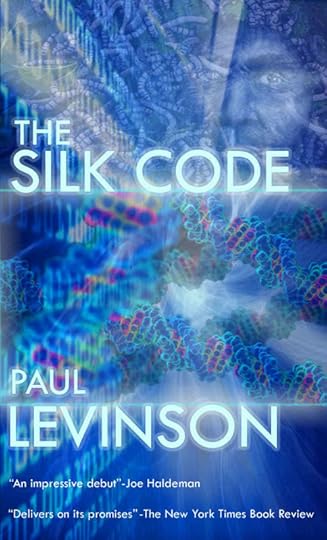
See also Sense8: Vibrant, Profound, Dangerous ... Sense8 2.1-2: The Mental, The Digital, and The Palpable ... Sense8 Season 2: Sense8tional
Paul Levinson's books ... Paul Levinson's music
Published on June 08, 2018 22:06
June 6, 2018
Humans 3.1: Class Warfare

Humans - the AMC series about androids, as good, in its own very different way, as HBO's Westworld - was back with the start of its third season last night.
Significantly, the theme was the same as that of Westworld: warfare between humans (guests) and synths (hosts), but fought out, at this point, on a very different tableau. Unlike Westworld, where almost all of the action is one theme park or another, in Humans the action is in the world itself - or, more specifically, the world in England, at this point.
Our starting cast of synths are almost all there, though in very different situations. None are in service to humans (with a small "h") in this third season. A new class of synths - with orange eyes, not sentient (presumably, cause you never know), and in loyal service to humans - are doing the jobs the earlier, green-eyed synths, our heroes, used to do. These synths, now fully sentient or woke in today's parlance, are in varying states of relationships with humans and themselves.
Some are trying to work it out with humans. Others have become ISIS-like terrorists. Max, always a great character, is leading one of the main groups of synths - those trying to have a peaceful co-existence with our biological kind. But, unsurprisingly, we humans are not making this easy.
I love Max's reasoning ability. When faced with the choice of taking batteries away from the comatose Leo (see last season for how that happened), which might well kill him, and giving the batteries to a badly hurt synth (Flash, whom Max has some feeling for), who will die without him, Max decides to give the batteries to Flash, deciding the batteries should go to someone who will die without them, instead of someone who just may die. We could be cynical and say that, behind this decision are Max's feelings for Flash - but we know he also profound feelings - of a different kind, but powerful - for Leo.
What would a human have done in Max's situation? Maybe the same thing, but not with such pinpoint logic.
The episode ends with a human commando team attacking Max's group. I'm suspecting, hoping, that both Leo and Max will survive.
See also Humans 2.1: Westworld meets Nashville ... Humans 2.2: The Consciousness Code ... Humans 2.3: Motives and Uploads ... Humans 2.4: Android Orgasms ... Humans 2.5-6: Children ... Humans 2.7-8: Universal
And see also Humans: In Ascending Order ... Humans 1.7: "I Think You're Dead, George"

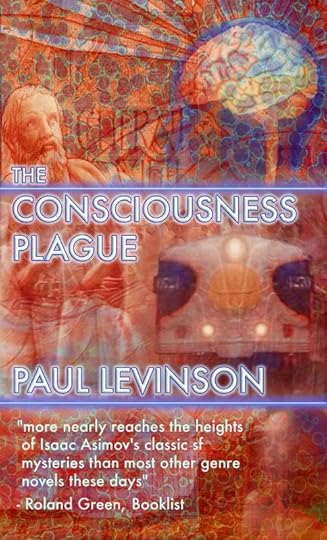
Shop Related Products
 The Soft Edge: A Natural History and F…$35.56 (8)
The Soft Edge: A Natural History and F…$35.56 (8)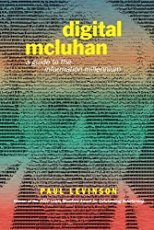 Digital McLuhan: A Guide to the Informa…$30.45$39.95 (7)
Digital McLuhan: A Guide to the Informa…$30.45$39.95 (7) The Plot to Save Socrates (Sierra Wate…$6.99 (38)
The Plot to Save Socrates (Sierra Wate…$6.99 (38)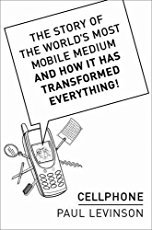 Cellphone: The Story of the World's Most Mo…$15.99$37.00 (6)
Cellphone: The Story of the World's Most Mo…$15.99$37.00 (6)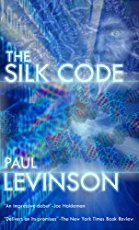 The Silk Code (Phil D'Amato series Book 1)$6.99 (37)
The Silk Code (Phil D'Amato series Book 1)$6.99 (37) Heat and Light: Advice for the Next Gener…$10.60 (8)Ads by Amazon Paul Levinson's books ... Paul Levinson's music
Heat and Light: Advice for the Next Gener…$10.60 (8)Ads by Amazon Paul Levinson's books ... Paul Levinson's music
Published on June 06, 2018 20:25
June 5, 2018
Killing Eve: Highly Recommended

Highly recommended. Not killing Eve - she's a great lead character - but the series, Killing Eve, which I just finished binge-watching the first season of on BBC America.
Killing Eve actually has two very memorable characters, rarely seen on television in terms of their mix of quirky intelligence, self-aware sarcastic humor, and utter devotion to their respective causes. One is Eve, an MI5 officer who gets enthralled (by a combination of volunteering and recruitment) into an MI6 Russia assignment involving a SPECTRE-like group, the spearhead of which is Villanelle aka Oksana, a deft, gifted, peerless assassin who is all but impossible to beat. The narrative arc continually surprises us with the way the two become obsessed with one another - obsessed not devoid of its positive elements all along the infatuation/love continuum - as Eve tries to stop and capture Villanelle and she tries to kill Eve. To give you an idea of what I'm talking about, and just to reveal one of many brilliant exchanges, when Villanelle surprises Eve who asks if Villanelle is there to kill her, the assassin replies that all she wants to do is have dinner with Eve.
It doesn't hurt that these two already iconic characters are played by Sandra Oh (Grey's Anatomy) as Eve and Jodie Comer (The White Princess) as Villanelle, who are mutually perfect in their performances. Indeed, so much so, that most of the other characters pale in comparison, even though theY'RE well acted and plotted.
As has been pointed out by more than one critic, most of these other characters are men, and the transcendence of Eve and Villanelle in Killing Eve could be interpreted as a paean to women and an attack on the male member (literally) in the world of spying, and, by extension, our world as a whole. Whatever interpretation you care to give it, Killing Eve is one high octane drama, as delightful as is thrilling, with surprises coming almost by the minute as the narrative unfolds.
After I caught my breath after the ending, I was glad to see there'll be a second season. But I wouldn't bet on who will be doing what ....

Paul Levinson's books ... Paul Levinson's music
Published on June 05, 2018 17:45
June 4, 2018
The Crossing 1.9: The New Machine
 Lots of important time-traveling things happening on The Crossing 1.9 tonight, the last episode before the two-hour series finale this coming Saturday night (maybe season finale, if ABC comes to its senses, see a little more about this below).
Lots of important time-traveling things happening on The Crossing 1.9 tonight, the last episode before the two-hour series finale this coming Saturday night (maybe season finale, if ABC comes to its senses, see a little more about this below).Among the most significant threads is Naomi using her knowledge of the future to gain agency, as I've been hearing said in the news these days (that is, people having "agency," or some kind of power over events). People from the future getting power by leveraging their knowledge is always implicit in time travel stories, but you don't see it utilized in this way too often.
Another important development: Lindaeur aka Noah is displaying some more leanings towards humanity - especially in contrast to cruel Greta - and we learn tonight that that's because he's a father, of the one child who came along in the first crossing (assuming the boy we see at the end of the episode is that child). Whatever the child's origin, Lindauer as a father is bound to look at such profound issues as life and the future in a more compassionate way.
But the most important development in tonight's episode is Diana's revelation that she has a way of making people disappear, without time-travel. This means the device she has in mind is, what, a teleportation machine? Should be fun to see, and I hope we find out next week.
Which brings me back to ABC. Hey, you have an opening, now that you've canceled Roseanne. Why don't you fill it with a renewal of The Crossing? There are some rednecks in the story, and the general message is people needing to get along (a big improvement over the real Roseanne). I saw today that there's a good chance that Roseanne will be rebooted without Roseanne - even if that happens, you can't go wrong also keeping a time-travel story with a sense of humor (like a character confusing Brad Pitt and Leonardo DiCaprio tonight - they did look a lot alike when they were younger, right?) blended into the drama with hope for the future.
And I'll be back here after what I hope is just the season finale, on Saturday night.
See also The Crossing: Lost Again, But OK ... The Crossing 1.2: Calling for More Time Travel ... The Crossing 1.3: The Missing Inventor ... The Crossing 1.4: Hofstra ... The Crossing 1.5: Migrations in Conflict ... The Crossing 1.6: Apex Antibodies ... The Crossing 1.7: The Locket
Paul Levinson interviewed about Roseanne Paul Levinson's books ... Paul Levinson's music
Published on June 04, 2018 20:48
June 3, 2018
Westword 2.7: Maeve vs. Dolores

Lots of powerful, profound, more or less scrutable threads in tonight's Westworld 2.7, but the one I'd like to focus on, just a tad more than the others, is Maeve vs. Dolores.
We've seen this contrast between the two most sentient, woke hosts before, and that's what it mostly is - a contrast - rather than a battle, even though the contrast almost ends tonight with Dolores killing Maeve. But the contrast survives, and it's one of the most telling in the series, even though it's between two hosts, not host vs. guest.
Maeve, as we've already seen many times, beginning with her going back into Westworld rather than escaping in the finale of the first season, is determined above all else to save her daughter. Dolores is sure that Maeve's daughter is just another part of the story that was woven inside Maeve, and therefore just another way of the programmers to control her. Dolores puts this to Maeve, who either rejects it or doesn't care - all she knows is she loves her daughter and won't abandon her. Dolores offers to put Maeve out of her misery - or, to be more precise, the misery that Dolores perceives Maeve to be in. Dolores could have ended Maeve, whatever Maeve may have wanted. But in a rare act, not so much of mercy but ethicality, she respects the free will that Maeve has, and leaves her to make her own choices. Note that she did not so the same for Teddy - as Maeve notes - and did her best to impose her will on his, by converting him into a killing machine.
So we're still left with no answer as to exactly who or what Maeve's daughter is. We can't even choose the proper pronoun. That's what I call good story telling.
The close second for best story thread in Westworld 2.7 is Ford vs. Bernard - or, rather, the part of Ford that's inside Bernard's head. That part is apparently so strong that it can change roles and start giving direct commands to Bernard, as Ford did to Bernard tonight. In terms of hosts, Bernard represents a third and very different alternative (definitely based on a human being) to Maeve vs. Dolores (unclear whom if anyone they're based on) - with Dolores, by the way, now revealed as loving her host father Peter more than ever, even though he's apparently just part of the story woven for Dolores, which makes her a little more like Maeve and her devotion to her daughter, if that's what's going on with Maeve, than Dolores may realize or acknowledge. (Hey, I just had an idea - could Maeve's daughter really be a young Maeve, a guest, and that's why adult Maeve needs to save her - to in effect save herself? Very hard to say at this point, and I'm not even sure how that would work.)
And last and not really least, The Man in Black came close to being killed tonight. Regarding which, I'll just note, isn't it interesting that MIB has nearly the same resistance to death as do the hosts, even though he's a guest par excellence?
See you here at the player piano that is my laptop's keyboard after next week's episode.
See also Westworld 2.1: Maeve's Daughter ... Westworld 2.2: "Narcissus Narcosis" ... Westworld 2.3: The Raj and Guns of the South ... Westworld 2.4: Questions Pertaining to Immortality ... Westworld 2.5: Telepathic Control
And see also Westworld 1.1: Isaac Asimov and Philip K. Dick Served Up by Jonathan Nolan, Lisa Joy, and J. J. Abrams ... Westworld 1.2: Who Is the Man in Black? ... Westworld 1.3: Julian Jaynes and Arnold ... Westworld 1.4: Vacation, Connie Francis, and Kurt Vonnegut ... Westworld 1.5: The Voice Inside Dolores ... Westworld 1.6: Programmed Unprogramming ... Westworld 1.7: The Story of the Story ... Westworld 1.8: Memories ... Westworld 1.9: Half-Truths and Old Friends ... Westworld Season 1 Finale: Answers and Questions ... Westworld 2.6: The Dangling Conversation

Paul Levinson's books ... Paul Levinson's music
Published on June 03, 2018 19:46
Westword 2.7: Maeve vs. Delores

Lots of powerful, profound, more or less scrutable threads in tonight's Westworld 2.7, but the one I'd like to focus on, just a tad more than the others, is Maeve vs. Delores.
We've seen this contrast between the two most sentient, woke hosts before, and that's what it mostly is - a contrast - rather than a battle, even though the contrast almost ends tonight with Delores killing Maeve. But the contrast survives, and it's one of the most telling in the series, even though it's between two hosts, not host vs. guest.
Maeve, as we've already seen many times, beginning with her going back into Westworld rather than escaping in the finale of the first season, is determined above all else to save her daughter. Delores is sure that Maeve's daughter is just another part of the story that was woven inside Maeve, and therefore just another way of the programmers to control her. Delores puts this to Maeve, who either rejects it or doesn't care - all she knows is she loves her daughter and won't abandon her. Delores offers to put Maeve out of her misery - or, to be more precise, the misery that Delores perceives Maeve to be in. Delores could have ended Maeve, whatever Maeve may have wanted. But in a rare act, not so much of mercy but ethicality, she respects the free will that Maeve has, and leaves her to make her own choices. Note that she did not so the same for Teddy - as Maeve notes - and did her best to impose her will on his, by converting him into a killing machine.
So we're still left with no answer as to exactly who or what Maeve's daughter is. We can't even choose the proper pronoun. That's what I call good story telling.
The close second for best story thread in Westworld 2.7 is Ford vs. Bernard - or, rather, the part of Ford that's inside Bernard's head. That part is apparently so strong that it can change roles and start giving direct commands to Bernard, as Ford did to Bernard tonight. In terms of hosts, Bernard represents a third and very different alternative (definitely based on a human being) to Maeve vs. Delores (unclear whom if anyone they're based on) - with Delores, by the way, now revealed as loving her host father Peter more than ever, even though he's apparently just part of the story woven for Delores, which makes her a little more like Maeve and her devotion to her daughter, if that's what's going on with Maeve, than Delores may realize or acknowledge. (Hey, I just had an idea - could Maeve's daughter really be a young Maeve, a guest, and that's why adult Maeve needs to save her - to in effect save herself? Very hard to say at this point, and I'm not even sure how that would work.)
And last and not really least, The Man in Black came close to being killed tonight. Regarding which, I'll just note, isn't it interesting that MIB has nearly the same resistance to death as do the hosts, even though he's a guest par excellence?
See you here at the player piano that is my laptop's keyboard after next week's episode.
See also Westworld 2.1: Maeve's Daughter ... Westworld 2.2: "Narcissus Narcosis" ... Westworld 2.3: The Raj and Guns of the South ... Westworld 2.4: Questions Pertaining to Immortality ... Westworld 2.5: Telepathic Control
And see also Westworld 1.1: Isaac Asimov and Philip K. Dick Served Up by Jonathan Nolan, Lisa Joy, and J. J. Abrams ... Westworld 1.2: Who Is the Man in Black? ... Westworld 1.3: Julian Jaynes and Arnold ... Westworld 1.4: Vacation, Connie Francis, and Kurt Vonnegut ... Westworld 1.5: The Voice Inside Dolores ... Westworld 1.6: Programmed Unprogramming ... Westworld 1.7: The Story of the Story ... Westworld 1.8: Memories ... Westworld 1.9: Half-Truths and Old Friends ... Westworld Season 1 Finale: Answers and Questions ... Westworld 2.6: The Dangling Conversation

Paul Levinson's books ... Paul Levinson's music
Published on June 03, 2018 19:46
Buckminster Fuller: The Real Dome

I spent the early part of this afternoon looking at Buckminster Fuller’s geodesic dome.
Who, you may ask, was Buckminster Fuller? He was my favorite theorist of technology and the human condition, also known as a futurist. He was and is still my favorite because his optimistic views - I and he would say they were not only optimistic but realistic - most closely agree with my own. He thought, for example, that human intelligence channeled through technology was the ultimate anti-entropic force, able to overcome the ubiquitous down escalator of existence and turn it upward.
This view has a plethora of practical significance. Just a few weeks ago, someone asked me how a media theorist would explain the fact that we have much more computing power in our current smartphones than our laptops of just a few years ago. "Buckminster Fuller's dymaxion principle," I immediately replied, citing the name Fuller gave for the phenomenon he noticed back in 1938 in his Nine Chains to the Moon, that as technologies are evolved, they do more and more with less and less size.
Unlike the myriad of easy critics in the academic world, Fuller saw technology as intrinsically, inescapably, and beneficially human. For the point of view of the interior mind, he also observed in Nine Chains to the Moon, there is no difference between eyes and eyeglasses.
Which brings us to the geodesic dome, a term Fuller took from earlier inventions, and applied it housing - "dymaxion housing" - which Fuller saw as the most efficient way, requiring the least amount of energy and human resources, to build efficient homes, offices, and structures for sundry human uses. The Dome at Woods Hole - pictured above - is oldest existing geodesic dome in the world, constructed in 1953 in Woods Hole in Falmouth, MA, and serving for many years as a restaurant. It's fallen into disrepair, and, just yesterday, my wife Tina saw a note on Facebook from Jessica Lipnack (an old friend of Tina's and mine, from the very early days of Connected Education), that she would be in Woods Hole today, as part of project to raise money for repair of the geodesic dome to full functionality.
We drove about an hour to see her at Highfield Hall near Woods Hole, and were rewarded not only by the first face-to-face conversation we had in decades, but the chance to meet and talk to Allegra Fuller Snyder, Buckminster Fuller's daughter, and see a small version of the dome, being constructed before our very eyes, to serve as a beacon for restoration of the original dome.
It was gratifying indeed to see the future still so much alive and kicking.


 Paul Levinson's books ... Paul Levinson's music
Paul Levinson's books ... Paul Levinson's music
Published on June 03, 2018 13:56
June 1, 2018
Fauda 2: Another Unforgettable Visit

I just finished the second season of Fauda on Netflix. It's every bit as good and even better than the first, which means a powerful mix of multi-level adversaries with subtle but significant differences and edge-of-your-seat battles in a portrait of an Israeli special forces team, this time mainly in Nablas, since 1995 under the Palestinian National Authority on the West Bank.
The most vividly rendered differences are among the Palestinians, which consist of at least three groups, those loyal to the Palestinian Authority, those loyal to Hamas, and those loyal to ISIS. These groups certainly don't like one another, and in the case Hamas and ISIS, are more than willing to kill any of the other two who get in their way. ISIS is the new and most dangerous ingredient in this simmering brew, ever on the verge of going deadly (though, ironically, the recent decline of ISIS in our real world may have made its depiction in Fauda 2 no longer completely valid).
The arch-enemy in Fauda 2 is connected to an enemy in Fauda 1, but I won't say anything more about El Makdessi in case you've not yet seen the first season. Suffice to say he's brilliant, charismatic, and ruthless, very well played by Firas Nassar. Walid, back from the first season and second-in-command at Hamas, is also a compelling character, hauntingly rendered by Shadi Mar'i.
The Israeli team begins much as it did in the first season, but there are sudden changes and near-changes throughout, so keep your eyes peeled. Lior Raz (also one of the creators of the series) was powerful again in the lead role of Doron, and I also especially liked the sensitive performances of Itzik Cohen as Captain Gabi and Doron Ben-David as Steve.
Other than El Makdessi, the most compelling new character is Anat Moreno (Mickey's niece), played by Moran Rosenblatt, who lights up every scene she's in. Gali (Neta Garty) and Shirin (Laëtitia Eïdo) are back with memorable performances.
Thinking back on Fauda 2, I feel the same way I felt after watching the first season: there's something indelibly real about it. The Hebrew and Arabic dialog, the at-once over-the-top but nuanced and detailed portrayals, make you feel like you're really there, in the streets and indoors, in the action -- with the saving grace that you can't be literally hit by any of the bullets. I'm much looking forward to another visit.
See also Fauda: Beyond Homeland

Paul Levinson's books ... Paul Levinson's music
Published on June 01, 2018 09:12
Levinson at Large
At present, I'll be automatically porting over blog posts from my main blog, Paul Levinson's Infinite Regress. These consist of literate (I hope) reviews of mostly television, with some reviews of mov
At present, I'll be automatically porting over blog posts from my main blog, Paul Levinson's Infinite Regress. These consist of literate (I hope) reviews of mostly television, with some reviews of movies, books, music, and discussions of politics and world events mixed in. You'll also find links to my Light On Light Through podcast.
...more
- Paul Levinson's profile
- 342 followers



